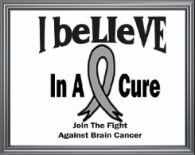Pediatric Brain Tumors Kill More Children Than Any Other Cancer! More than 359,000 people in the U.S. were living with a diagnosis of a primary brain and central nervous system tumor in the year 2000.
In the year 2000 more than 26,000 children in the U.S. were living with the diagnosis of a primary central nervous system tumor. Each year 3,400 new cases are diagnosed.
Every day nine children in the U.S. are diagnosed with a brain tumor.
Brain tumors are the leading cause of cancer death from childhood cancer, accounting for 24 percent of cancer-related deaths in 1997 among persons up to 19.
76 percent of children diagnosed with a brain tumor are younger than 15.
There are more than 120 different types of brain tumors, making effective treatment very complicated.
Pediatric brain tumors are different from those in adults and are often treated differently.
The combined five-year survival rates for childhood brain tumors has increased slowly, from 54 percent to approximately 60 percent. However, for some pediatric brain tumors (e.g., brain stem gliomas, atypical teritoid/rhabdoid and glioblastoma multifome), long-term survival rates remain below 20 percent.
Because brain tumors are located at the control center for thought, emotion and movement, their effects on a child's physical and cognitive abilities can be devastating.
Quality of life for survivors of pediatric brain tumors is influenced by the long-term side effects of treatments such as chemotherapy and radiation.
Some brain tumor survivors require physical, cognitive and rehabilitation services to allow them to return to tasks of everyday life.
Unlike other benign tumors, benign brain tumors may recur and may result in death.
Brain tumors are treated by surgery, radiation therapy and chemotherapy, used either individually or in combination.
Enhancing the quality of life of children with brain tumors requires access to quality specialty care and ready availability of follow-up care and rehabilitative services.
Improving the outlook for children with brain tumors requires research into the causes of and better treatments for brain tumors.
Your body after brain surgery...
As you probably know better than anyone, the surgery and treatment used to fight brain and spinal cord tumors can cause many changes in your body. Moreover, these changes often affect multiple areas of functioning, including mental, emotional, spiritual, psychological and physical health. Our bodies are amazingly resilient and adaptive despite the trauma often caused by craniotomies, other surgeries and treatment protocols.
Sometimes, though, our bodies have a harder time "bouncing back" if we have undergone multiple surgeries, completed many rounds of chemotherapy or radiation or if diagnosis and treatment began at an early age. In any case, there are a variety of things we can do to help our bodies heal and recover what has been lost by treatment. As a matter of fact, even when damage to our physical health is such that some or all of it can not be recovered, healing your body in other areas can help reduce stress and anxiety and can ease emotional challenges such as anger or depression. Ultimately, this can positively impact your relationships with others and your ability to maintain hope in the face of adversity.
Pediatric Brain Tumor Research...
Brain tumors in children are the leading cause of deaths from childhood cancer. They are the second most frequent malignancy of childhood and the most common form of solid tumors. The prognosis for children with these central nervous system tumors is poor and, depending on tumor type, has not changed over the past 10 to 20 years. The effects of the tumor and its treatment often affect the quality of the life of the child. In 2000 the National Cancer Institue and the National Institute for Neurological Diseases and Stroke supported a Progress Review Group on Brain Tumors in adults and children. Expert basic and clinical scientists were assembled as well as patient advocates to identify and prioritize the unmet the scientific needs and opportunities considered critical to the advancement of research in the field of brain tumors.
The "Brain Tumor Progress Review Group" has determined that "on the largest scales, the overriding challenges for research into pediatric brain tumors are to improve outcome for children with a host of different types of brain tumors. The predominant barriers are the relative infrequency of any individual tumor types, the presence of embryonal/primitive tumors that often disseminate to the leptomeniges, and the lack of interest in, focus on, and funding for research on these primitive tumors." Specific challenges associated with improving outcomes for children with pediatric brain tumors and barriers to meeting these challenges are grouped into four categories: tumor biology, epidemiology, treatment, and long-term sequelae.
The Pediatric Brain Tumor Foundation (PBTF) has a long history of funding that includes basic, translational, and clinical research awards. Additionally, the Pediatric Brain Tumor Foundation has funded quality-of-life research. The research programs of the Pediatric Brain Tumor Foundation have grown each year, with greater commitment of funds to support and encourage researchers to enter the field of pediatric brain tumor research. The Pediatric Brain Tumor Foundation has supported collaborative research symposiums such as the Symposium on Pediatric Neuro-Oncology; the Society for Neuro-Oncology; and the International Symposium on Brain Tumor Research and Therapy in an effort to keep the research needs of children with brain tumors in the minds of laboratory, translational and clinical researchers. Today the Pediatric Brain Tumor Foundation is the largest non-governmental funding agency of pediatric brain tumor research, but they are not satisfied and continue to push forward to increase the quantity and quality of research for pediatric brain tumors.
Please make a donation today, tomorrow or anytime to my fund-raising efforts for the Pediatric Brain Tumor Foundation. Research is the only way, we will ever stop this dreadful disease. Each dollar represents another day of hope for the thousands of children and their families that are battling this monster. Thank you.
Subscribe to:
Post Comments (Atom)


















2 comments:
Thank you for all you do for the kids Kathy.
God bless,
JJs Dad ~ Jim
There are different kind of brain tumors but the causes of most of the tumors are still unknown. Brain tumors are most complicated and difficult to deal with. The key factor in fighting these deadly diseases is an early diagnose.
Post a Comment